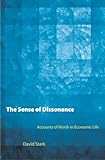The Sense of Dissonance : Accounts of Worth in Economic Life / David Stark.
Material type: TextPublisher: Princeton, NJ : Princeton University Press, [2011]Copyright date: ©2009Edition: Course BookDescription: 1 online resource (264 p.) : 2 line illusContent type:
TextPublisher: Princeton, NJ : Princeton University Press, [2011]Copyright date: ©2009Edition: Course BookDescription: 1 online resource (264 p.) : 2 line illusContent type: - 9780691132808
- 9781400831005
- 306.3 22
- HD6955 .S785 2009eb
- online - DeGruyter
- Issued also in print.
| Item type | Current library | Call number | URL | Status | Notes | Barcode | |
|---|---|---|---|---|---|---|---|
 eBook
eBook
|
Biblioteca "Angelicum" Pont. Univ. S.Tommaso d'Aquino Nuvola online | online - DeGruyter (Browse shelf(Opens below)) | Online access | Not for loan (Accesso limitato) | Accesso per gli utenti autorizzati / Access for authorized users | (dgr)9781400831005 |
Frontmatter -- Contents -- Preface -- 1. Heterarchy: The Organization of Dissonance -- 2. Work, Worth, and Justice in a Socialist Factory -- 3. Creative Friction in a New-Media Start-Up -- 4. The Cognitive Ecology of an Arbitrage Trading Room -- 5. From Field Research to the Field of Research -- Reprise -- Acknowledgments -- Bibliography -- Index
restricted access online access with authorization star
http://purl.org/coar/access_right/c_16ec
What counts? In work, as in other areas of life, it is not always clear what standards we are being judged by or how our worth is being determined. This can be disorienting and disconcerting. Because of this, many organizations devote considerable resources to limiting and clarifying the logics used for evaluating worth. But as David Stark argues, firms would often be better off, especially in managing change, if they allowed multiple logics of worth and did not necessarily discourage uncertainty. In fact, in many cases multiple orders of worth are unavoidable, so organizations and firms should learn to harness the benefits of such "heterarchy" rather than seeking to purge it. Stark makes this argument with ethnographic case studies of three companies attempting to cope with rapid change: a machine-tool company in late and postcommunist Hungary, a new-media startup in New York during and after the collapse of the Internet bubble, and a Wall Street investment bank whose trading room was destroyed on 9/11. In each case, the friction of competing criteria of worth promoted an organizational reflexivity that made it easier for the company to change and deal with market uncertainty. Drawing on John Dewey's notion that "perplexing situations" provide opportunities for innovative inquiry, Stark argues that the dissonance of diverse principles can lead to discovery.
Issued also in print.
Mode of access: Internet via World Wide Web.
In English.
Description based on online resource; title from PDF title page (publisher's Web site, viewed 29. Jul 2021)


